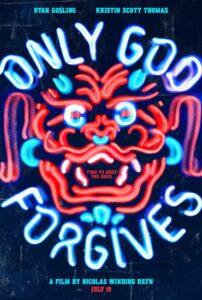 Although it’s tempting, I resisted using the line, “if only god forgives Nicolas Winding Refn for making this movie,” as the subheading for this review. For starters, it would be a cheap tactic and, more importantly, it wouldn’t accurately summarize my feelings about Refn’s new movie. For all the awkward aspects to be found in this film, I won’t pretend it isn’t entertaining. As a B-movie concept/narrative masquerading as arthouse cinema, this film either takes itself way too seriously or is laughing right at you, the viewer. It’s all a matter of perspective, I suppose.
Although it’s tempting, I resisted using the line, “if only god forgives Nicolas Winding Refn for making this movie,” as the subheading for this review. For starters, it would be a cheap tactic and, more importantly, it wouldn’t accurately summarize my feelings about Refn’s new movie. For all the awkward aspects to be found in this film, I won’t pretend it isn’t entertaining. As a B-movie concept/narrative masquerading as arthouse cinema, this film either takes itself way too seriously or is laughing right at you, the viewer. It’s all a matter of perspective, I suppose.
This is Refn’s ninth feature film, though he didn’t appear on most American moviegoers’ radars until 2011’s “Drive.” In “Only God Forgives,” the writer/director re-teams with his “Drive” star Ryan Gosling, who proves he can play quiet and brooding with the best of them. Despite the fact that Gosling’s Julian is the film’s central character, it’s an oddly throwaway role. Refn doesn’t give the character much to do, as he floats through the film primarily as a muted, reactive observer.
Set in Thailand, and ostensibly a revenge flick, the story is set in motion when Julian’s older brother, Billy (Tom Burke), is killed. The perpetrator of the crime had an understandable motive — he’s the father of a teenage girl Billy raped and murdered. This act of vengeance brings Julian’s cold as ice, hard as nails American mother, Crystal (Kristin Scott Thomas), to the country — and she’s hell-bent on retribution.
Crystal is also the head of the family drug ring. While Julian spends his days running a Muay Thai boxing gym, he pays the bills through the family’s illicit business. Crystal’s intrusive presence brings the woman, Julian and a couple of her henchmen squarely into the crosshairs of Chang (Vithaya Pansringarm), a steely psychotic, vicious police chief who moves at half the speed of typical human beings and blows off steam singing at a lounge when not dismembering people with a sword.
In the ensuing 24 hours after seeing this film, I was somewhat inclined to believe, as I alluded to in the opening paragraph, that “Only God Forgives” is a twisted comedy — basically a giant 90-minute wink at the audience. I’ve only seen a few of Refn’s films, but I’ve been impressed with them to the point that I gave him the benefit of the doubt. With each passing day, I feel more this was wishful thinking on my part.
Refn, DP Larry Smith and production designer Beth Mickle are responsible for making the most overtly, meticulously stylized film I’ve seen in years — it makes a Tarantino movie look like a mumblecore film. Every shot is so carefully framed to appear like an award winning photograph (assuming there’s an award for “Most Pretentious”) that it becomes distracting and just ridiculously self-aware. The director clearly wants to be the star of the show, which generally isn’t a good sign for any film. If an artist could literally get drunk on praise/success, which Refn was showered with when “Drive” was released, he must’ve been twice the legal limit during production of this movie.
Yet I can’t truly say I dislike “Only God Forgives.” Its eccentricities may be more calculated than authentic, but even when the film falls flat on its face, it does so in an amusing way. Whatever tone Refn intended, Kristin Scott Thomas certainly interprets the material as comedy, and she goes gloriously over the top, dispensing one quotable line after the next. It’s a single-note performance to be sure, but she digs into it with gusto. Refn handles the violence with his usual vigor, which yields moments of genuine tension. It’s a deliberately paced film, but I was never disinterested.
In my view, the less seriously you take this film, the more likely you are to enjoy it on some level. That said, I’m not sure there’s much about this movie that can be taken seriously. With “Only God Forgives,” Refn may have invented the subgenre of self-mocking violent comedy. After its initial theatrical run concludes, this film should have a long life on the midnight screening circuit.
